Stories
Stories
Bathurst Quay Neighbourhood Air Quality Study Presentation and Community Engagement Workshop
On the evening of January 22, 2024, the “Bathurst Quay Neighbourhood Air Quality Study Presentation and Community Engagement Workshop” took place at the Waterfront Neighbourhood Centre. This event was a significant milestone for the “Campus-community Partnership for Reducing Air Pollution in the Bathurst Quay Neighbourhood,” a research project that began in 2019.
This collaborative research, involving the Bathurst Quay Neighbourhood Association (BQNA), Billy Bishop Airport, the City of Toronto, and academic experts, had a clear dual mandate: to comprehensively assess the air pollution levels in the neighbourhood and to disseminate this knowledge for informed urban planning, transportation, and airport operation policies.
After extensive research efforts spanning several years, the workshop successfully gathered approximately 70 stakeholders from diverse sectors such as academia, industry, government, and community organizations. Of these, 50 attendees joined in person at the venue, while others connected online, facilitating a comprehensive dialogue on the local air quality issues.
At 6:30 p.m., Joan Prowse, Chair of the Bathurst Quay Neighbourhood Association (BQNA) and Study Co-Chair, called the meeting to order. Her welcoming words set the tone for an evening of meaningful engagement and collective problem-solving.
Professors Marianne Hatzopoulou and Greg Evans, researchers from the University of Toronto, provided crucial background on the study, emphasizing the importance of air quality in urban environments. Concurrently, Professor Jeffrey R. Brook from the Dalla Lana School of Public Health hosted an online session, broadening the workshop’s inclusivity with virtual participants.
Ph.D. candidate Emily Farrar and Dr. Junshi Xu took the stage to present their in-depth analysis, addressing critical research questions about ultrafine particles (UFP) at Bathurst Quay, contributing factors to elevated UFP levels, and the impact of various pollution sources.
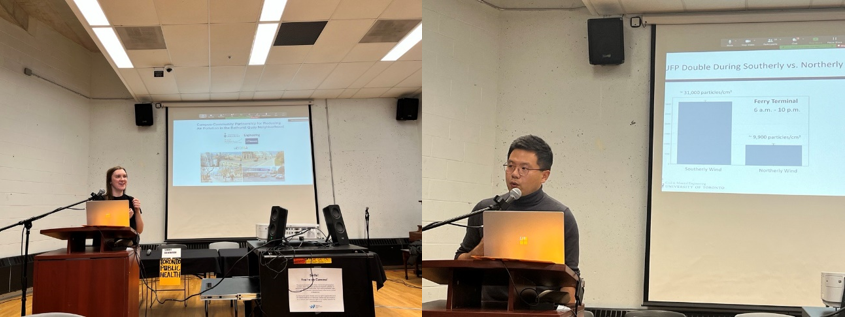
The workshop then transitioned to a collaborative discussion phase, with input from project partners such as Jay Paleja of the City of Toronto Waterfront Secretariat, Shane Bonthron from Toronto Public Health, Dr. Denis Corr of Ports Toronto (Billy Bishop Airport), and Joan Prowse of BQNA. Their diverse perspectives provided a multi-dimensional view of the air quality challenges faced in the neighbourhood.
The subsequent workshop phase was particularly interactive. Facilitated by leaders and notetakers at each table, discussions focused on actionable steps for improving air quality, with the conversation spanning government policy, community initiatives, and airport contributions.


The second workshop session was even more dynamic. Each table, led by a facilitator and notetaker, explored potential solutions and actions. The questions were targeted: What can governments, the community, and the airport do to improve air quality? As the evening progressed, the room transformed into a gallery of ideas. Participants walked around, viewing other tables’ concepts and marking the ones they found most compelling with dots. The most resonating ideas centered around stringent regulations, idling reduction enforcement, and setting health standards coupled with UFP research.


Electrifying Ontario's School Bus Fleet: Health Benefits, Economic Implications, Logistic Challenges, and Community Engagement, December 2023
Positive Zero Transport Futures, along with the Mobility Network, hosted “Electrifying Ontario’s School Bus Fleet” on December 14th, 2023, at the Innis Town Hall Theatre on the University of Toronto campus. The event brought together two keynote speakers and five expert panelists for an engaging discussion on the benefits and hurdles of electrifying the province’s school buses. The event welcomed over 80 attendees from academia, industry, government and community organizations. (Video recording available here)
Approximately 20,000 school buses carry over 833,000 students to school every day in Ontario, with over 90% of these buses running on diesel fuel. Air pollution from diesel buses has been linked to serious health impacts on the children they transport each day. The rapid deployment of electric school buses across Ontario’s school boards would protect children’s health, reduce carbon emissions, and strengthen the province’s automotive manufacturing industry. Beyond the numerous benefits electric school buses can provide, they offer a rich opportunity for community collaboration. While progress to electrify school buses is being made in other provinces, Positive Zero Transport Futures saw an important opportunity to discuss the delay in electrification of school buses in Ontario.
Dr. Marianne Hatzopoulou, Professor and Chair of the Civil and Mineral Engineering Department at the University of Toronto, welcomed attendees with opening remarks and moderated questions and discussions throughout the evening.
“We think about children’s health in terms of nutrition, we think about providing safe play spaces for them. Recently, we started becoming aware of the school environment, air purifiers, and indoor environments in which we operate. But I still think we haven’t yet made the connection to transportation,” said Dr. Hatzopoulou.
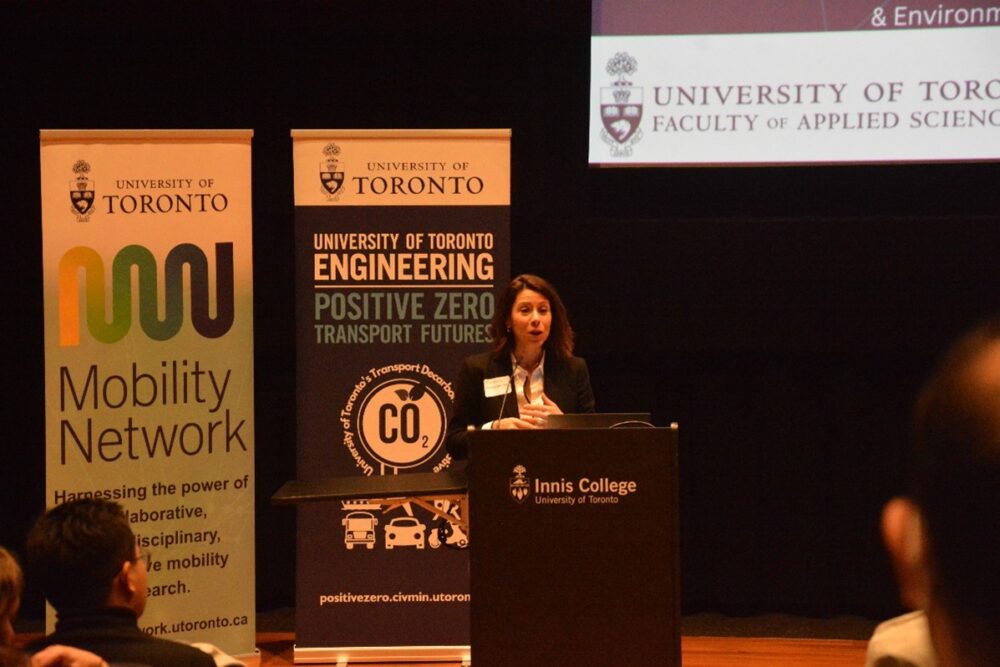
Dr. Marianne Hatzopoulou gives opening remarks
Our first keynote speaker, Sue Gander, is the Director of the Electric School Bus Initiative at the World Resources Institute. The Electric School Bus Initiative is aiming to electrify the entire U.S. fleet of 480,000 school buses by 2030. Sue shared with the audience the lessons her team has learned as part of this transition. As of today, the U.S. has 69,000 children riding the almost 6,000 electric school buses operating in nearly every state across the country.
Sue spoke to funding initiatives in place in the U.S., that while there are tremendous operational savings, “we need incentives to buy down the initial cost so that we can get this in place, and work to a place where there is cost parity.” Cautioning that “every time a new bus is bought, it’s on the road for 15 years.”
Challenges beyond the higher upfront cost include infrastructure development, learning new technology, and overcoming technology myths, each of which disproportionately impact underserved communities. Sue also shared on how her team has prioritized equity in the electric school bus transition. To learn more about some of Sue’s talking points on equity, you can check out this report that came out shortly after the event.
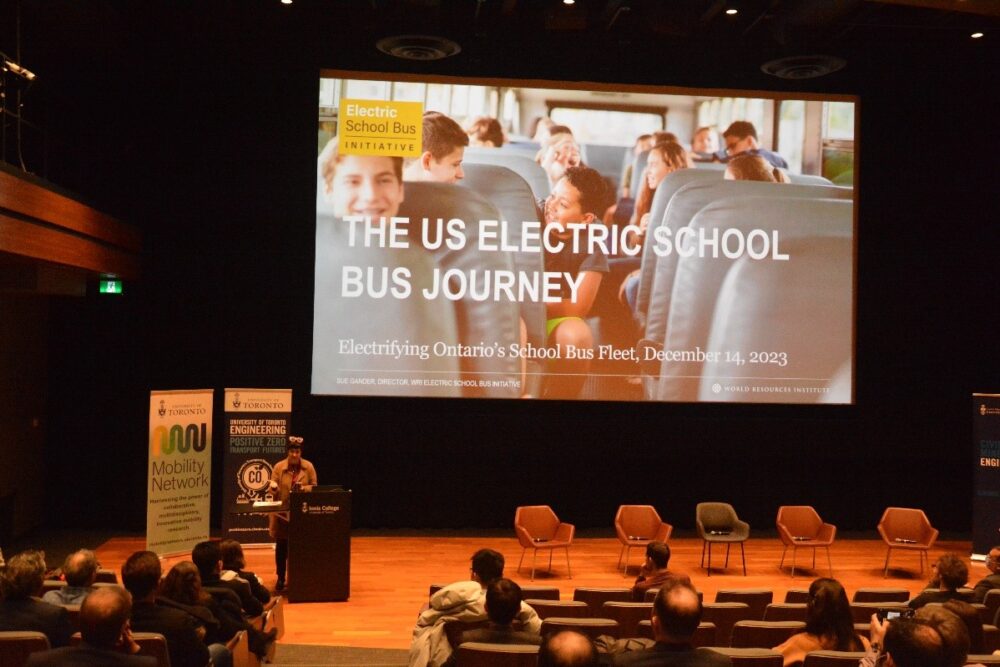
Sue Gander (World Resources Institute) gives keynote speech
Dr. Sara Adar, our second keynote speaker, is an Associate Professor and Associate Chair of Epidemiology at the Michigan School of Public Health. Dr. Adar spoke primarily about the health and educational impacts of diesel buses on children, sharing results from two studies her group has conducted, one being a cohort study of 300 children in Washington school districts and the other being on national benefits of investments in cleaner school buses.
Dr. Adar’s team installed an air quality monitor on a bus, collecting measurements on over 600 rides. Switching from older diesel buses to newer, cleaner diesel buses reduced concentrations of harmful particles by 10% to 50%. Her team also found that switching to buses with clean fuels and technologies resulted in students being 5% to 10 % less likely to miss school, and children with severe asthma had 15% to 20% fewer absences. Extrapolating those results to the entire U.S. population, Dr. Adar’s team “estimated that the switch to cleaner fuels resulted in 14 million fewer absences per year.”
From 2012 through 2017, the EPA School Bus Rebate Program invested over $27 million to replace older diesel buses. Dr. Adar’s team found a slight overall improvement in attendance with the adoption of cleaner buses but a much larger improvement in areas where the oldest buses were replaced specifically. “Based on the EPA’s investment of $27 million, we estimate that we’re seeing $350 million in benefits only because of absenteeism alone.” Dr. Adar’s team hopes to extend their work to now look at the health and educational benefits of electric school buses.
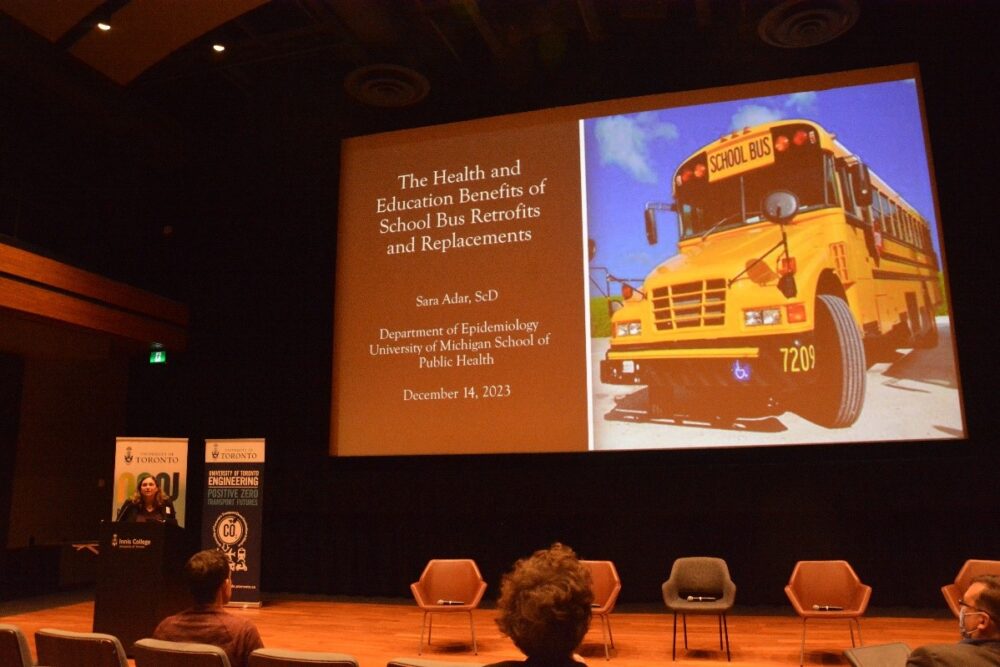
Dr. Sara Adar (Michigan School of Public Health) gives keynote speech
The event featured five different panel speakers. Christopher Ralph is the Manager of Sustainable Mobility at Lion Electric, a top provider of electric school buses in North America. Adam Thorn, Director of Transportation at the Pembina Institue, spoke on their recent report strategizing the decarbonization of medium- and heavy-duty vehicles and the economic benefits of electric school buses for Ontario. Cedric Smith, Director of Transportation at Pollution Probe, shared recent findings from their electric school bus pilot project in Calgary. Kevin Hodgkinson, General Manager at the Toronto Student Transportation Group, spoke about how school boards and student transportation contracts operate in Ontario. Helen Doyle, a representative from Canadian Partnership for Children’s Health and Environment, spoke to health benefits of school bus electrification, including improved air quality, reduced climate change risks, and modelling climate-friendly behaviour to the next generation.
The panel discussion received questions from the audience around the proper disposal of the retired diesel buses. While they were not recommended for retrofits as long-range school buses due to issues surrounding lifespan and range, it was suggested that retrofitted buses may be able to be used in urban, small range scenarios such as shuttle services. The WRI’s Electric School Bus Initiative also recently announced their LEGO Build to Change, a free lesson plan to have classrooms brainstorm what can be done with the retired diesel buses.
The audience asked our panel speakers what, in their opinion, is the largest barrier to school bus electrification in Ontario. Barriers discussed included lack of tracking of health benefits, upfront costs, charging infrastructure, and myths surrounding the risks of electric school buses. “How do we find a methodology to capture those savings and transfer those cost benefits to the people that will do the heavy lifting?” Christopher Ralph (Lion Electric) speaks to shifting the cost burden off the operator and onto institutions that will gain from the health and operation benefits. “If you ask any of the operators most of them would agree they’re all on board with electrifying their school bus fleet. The issue is, there’s no money,” said Kevin Hodgkinson (Toronto Student Transportation Group).
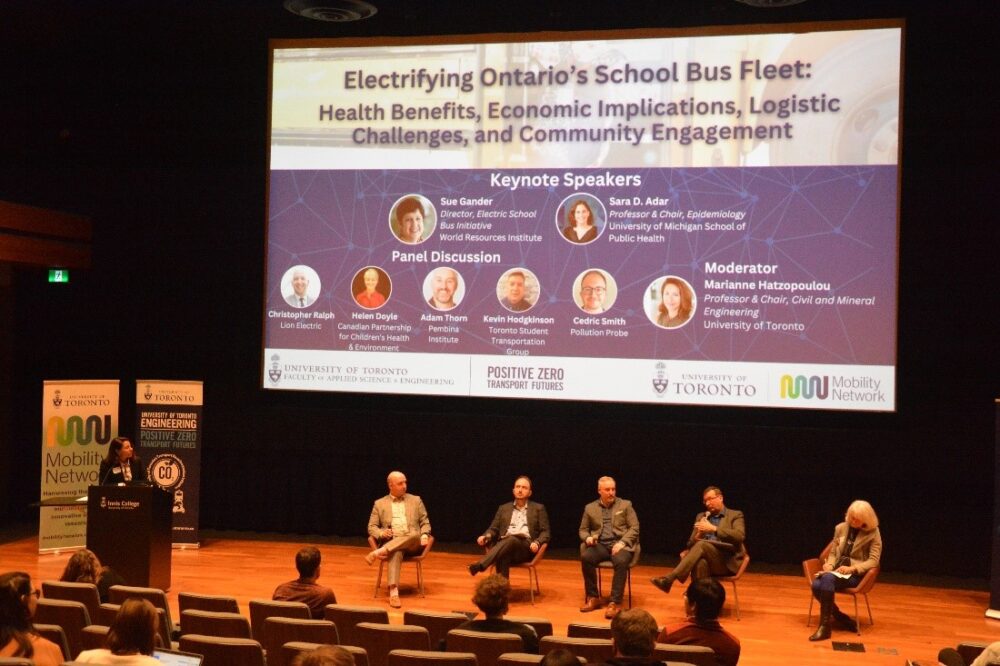
Panel speaker discussion featuring (left to right) Christopher Ralph (Lion Electric), Cedric Smith (Pollution Probe), Adam Thorn (Pembina Institute), Kevin Hodgkinson (Toronto Student Transportation Group), and Helen Doyle (Canadian Partnership for Children’s Health & Environment)
The panel speakers spoke to the importance of government support to ramp up adoption of electric school buses in Ontario, similar to what has been done in the province of Quebec that has a plan to electrify 65% of their school buses by 2030. “That’s why something like a mandate can be so important. What you’re doing is you’re telling manufacturers that this is what you have to produce,” said Adam Thorn (Pembina Institute).
The panel speakers discussed issues around the logistics of electric school buses. While the electric school bus has a range of 200km, Cedric Smith (Pollution Probe) shared from the pilot project in Calgary that their team found buses had an actual range of 73km to over 200km. During the winter, buses need to be preheated. Below 10 degrees, the electrical heating system must be used, decreasing the range by a third. Vehicle-to-grid was also discussed. Lion Electric is currently using V2G in several states in the U.S., but the IESO is not quite ready for this technology from a policy standpoint in Ontario.
The audience also asked about maximizing health benefits for children, questioning if buses is the best way to accomplish this. The City of Toronto released new funding this year to increase active transportation to school. Several high school students in Toronto also use public transit to travel to school. Helen Doyle (CPCHE) shares that when discussing active transportation, we “can’t just talk about the physical activity benefits, we also need to talk about the air quality benefits and the climate benefits, because it’s all connected.”
The evening concluded with a networking reception catered by Acacia Café. Recordings of the keynote and panel speaker presentations can be viewed here. Positive Zero Transport Futures, a living lab approach enabling transport innovations with zero emissions and positive social outcomes, is proud to have brought together so many stakeholders in school bus electrification and provided a space for an engaging and overdue discussion.
Smart Freight Centre Symposium, November 2023
Positive Zero Transport Futures graduate students presented original research at the 2023 Smart Freight Centre Symposium at the University of Toronto on November 10, 2023. The day comprised three sessions: Transforming our Cities for Freight, Transforming Freight in our Communities, and Transforming Technology in Freight.

PhD candidate Sara Torbatian shared her work “Societal co-benefits of zero-emission on-road freight movements.” Using an integrated modelling framework developed for the Greater Toronto and Hamilton Area (GTHA), Sara examined the air quality and health implications of increased light, medium, and heavy-duty truck electrification. This was done by combining a chemical transport model with spatially and temporally resolved commercial vehicle movements in the GTHA. The analysis was also conducted through an environmental justice lens, evaluating how truck electrification impacts the most disadvantaged communities. The work has concluded that electrification of heavy-duty trucks reduces air pollutant concentrations, and the highest reductions occur in communities with the highest material deprivation.
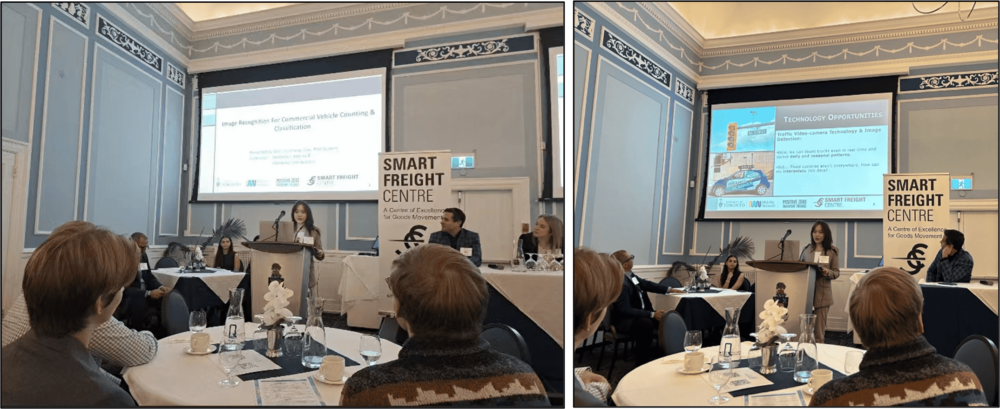
Yunhong (Doris) Tian shared her work “Image Recognition for Commercial Vehicle Counting & Classification.” In response to a gap in methods to understand the spatial and temporal distribution of trucks, Doris is exploring how traffic video-camera technology can be adapted to estimate truck movements across an entire network. This is done through a combination of traffic simulation, statistical analysis, primary data collection and machine learning. This framework will be used to develop a sampling protocol capable of estimating truck counts on every urban road despite sampling location limitations.

Milad Saedi presented his work “Harnessing the routes of delivery to map urban air quality.” The study explores using mobile air quality samplers installed on courier trucks to develop a model capable of predicting fine particulate matter in downtown Toronto. Using a land use regression model developed with XGBoost algorithms, Milad was able to combine the mobile monitoring from courier trucks with land use, meteorology, and emissions to build robust prediction models. The study’s findings will provide insight into optimizing predictor selection, handling outliers, and the potential of utilizing mobile monitoring to develop enhanced spatial resolution of air quality in urban areas.
This was the 5th annual Smart Freight Centre Symposium, bringing together government, industry, and nonprofits speakers. The symposium was chaired by Dr. Matthew Roorda, the Canada Research Chair in Freight Transportation and Logistics and a professor in the Department of Civil & Mineral Engineering at the University of Toronto.
International Society of Exposure Science Annual Meeting, “Connecting Communities & Science through Addressing Environmental Exposures”, August 2023
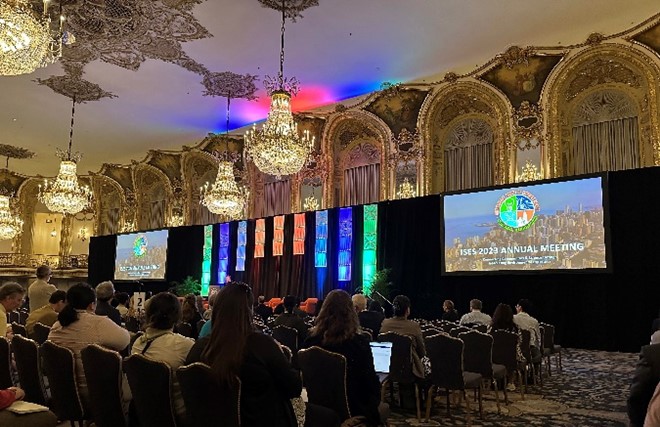
Multiple members from Positive Zero Transport Futures attended the International Society of Exposure Science Annual meeting in Chicago, Illinois, from August 27th – 31st. The theme of the conference, “Connecting Communities & Science through Addressing Environmental Exposures”, explored synergies between academia and communities in identifying, reducing, and improving exposures, with a primary focus on new and re-emerging environmental exposures.
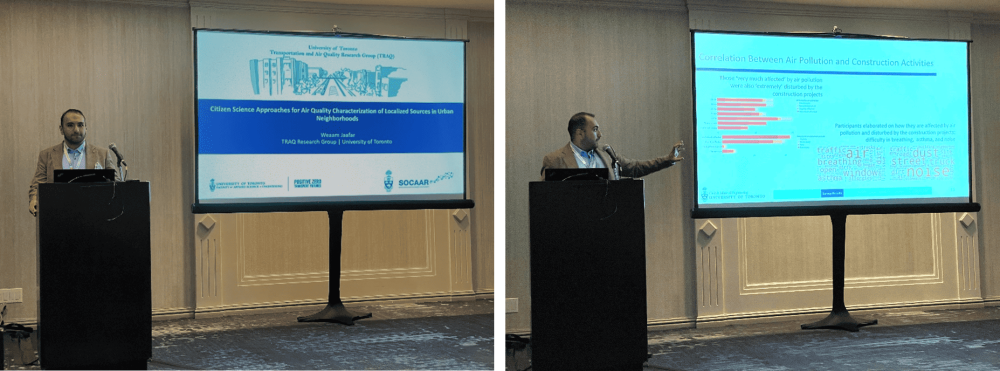
Weaam Jafar, a PhD candidate, presented his work as part of the symposium “Providing Individuals and Communities with Air Pollution Data to Improve Health, Reduce Exposure, Modify Behaviors, or Increase Knowledge.” His presentation, entitled “Citizen Science Approaches for Air Quality Characterization of Localized Sources in Urban Neighborhoods” shared recent findings from fine particulate matter sensors installed by citizen scientists on balconies near dense construction activity in Toronto. Results showed higher PM2.5 concentrations near construction sites, and that survey respondents felt that their air quality was poor and attributed to construction activities and heavy traffic.
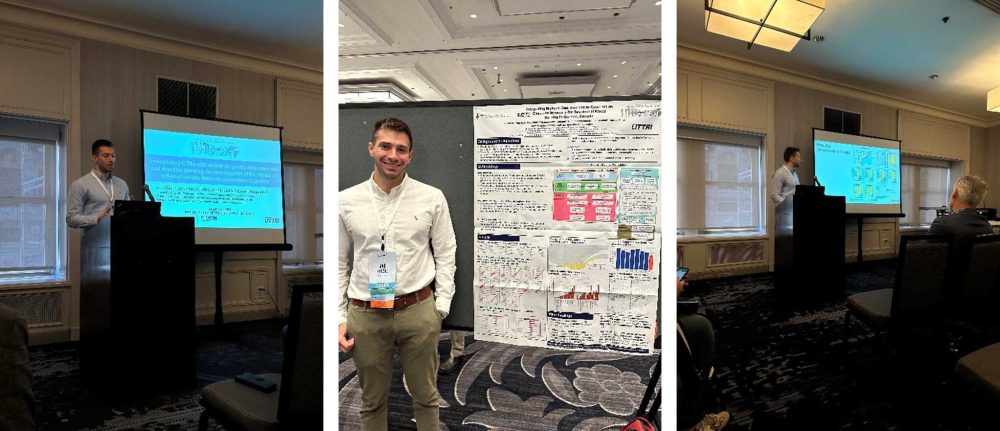
PhD candidate Jad Zalzal presented his poster “Integrating Multiple Data Sources to Generate an Emission Inventory for Residential Wood Burning in Quebec, Canada” in the symposium session “Machine Learning in Environmental Exposure Assessment.” This work aims to address gaps in emission inventories for residential wood burning using a novel approach that combines real estate data, socioeconomic, demographic and land use predictors from census data, and survey data. This inventory will be used as an input to a chemical transport model to study the impacts of residential wood burning on air pollution.
Jad Zalzal also presented his work “Downscaling CTMs with Mobile Air Quality Measurements and Machine Learning: An Investigation of the Impact of Different Vehicle Fleets on Environmental Justice” in the symposium session “Applications of Mobile Monitoring for Environmental Exposures – Design, Opportunities, Challenges and Future Directions.” This study used mobile air quality measurements and land use machine learning models to downscale 1km-resolution chemical transport model outputs to 100m-resolution outputs to better capture intra-urban variability of air pollution concentrations. The findings highlight the importance of high-spatial resolutions on urban air pollution for environmental justice and found that downscaling techniques using land use regression is an adequate approach.
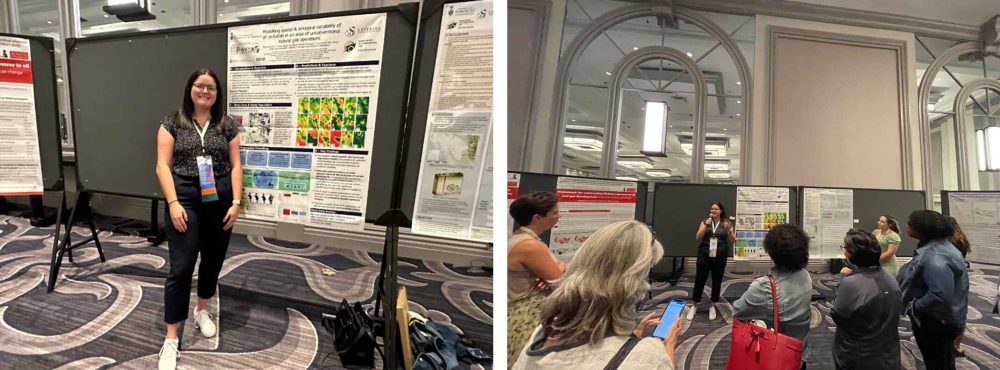
Miranda Doris, a PhD student, presented her research in the facilitated poster session “Oil and Gas Development: Exposure, Health, and Justice.” Her poster, entitled “Modelling Spatial & Temporal Variability of Air Pollution in an Area of Unconventional Natural Gas Operations,” presented recent findings on the development of land use regression models to predict air pollutant concentrations at the homes of pregnant women living near hydraulic fracturing activities. Predictor variables for the regression models were developed using oil and gas production activities, including well operations, facilities, pipelines, road segments and annual emissions data. This work highlights the lack of monitoring of some hydraulic-fracturing air pollutants, including hydrocarbons, near areas of residence. These models will help investigate associations between prenatal exposure to air pollutants related to natural gas extraction and adverse health outcomes.
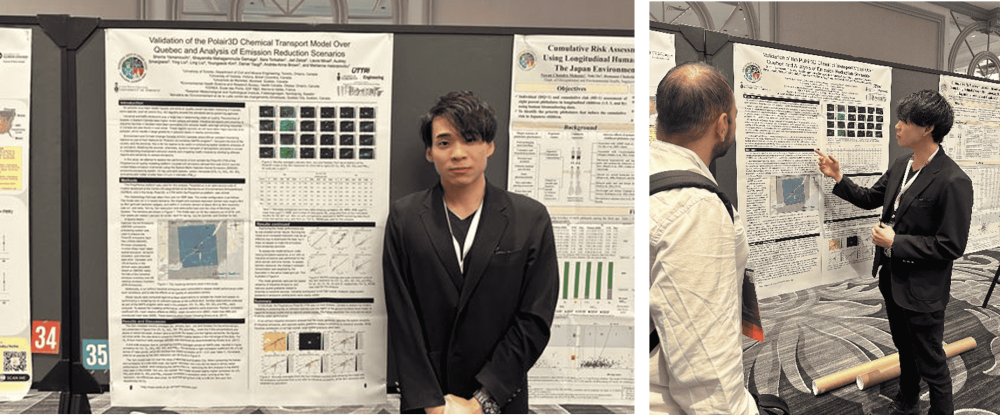
Shoma Yamanouchi, a Postdoctoral Fellow, presented his poster “Validation of the Polair3D Chemical Transport Model Over Quebec and Analysis of Emission Reduction Scenarios” in the symposium session “Environmental Exposure and Health from a Multi-Regional Perspective.” In this study, the model was validated against surface observations, and was used to analyze changes in population exposure as a result of scenarios affecting traffic and industrial emissions. This was the first dissemination of our team’s validation efforts for Polair3D in a Canadian context. The performance of the model was found to be in line with other models over Canada, and comparable to Polair3D’s performance over Europe.
The ISES 2023 Annual Meeting had the largest number of attendances yet, welcoming over 700 attendees from over 30 different countries. The five-day conference featured 64 different symposium sessions, nearly 350 talks, and 282 posters. Positive Zero Transport Futures is thankful for having such an engaging space to share recent findings of five different ongoing projects.
Emerging Mobility Scholars Conference, “Cause or Solution? Urban Mobility in an Era of Climate Emergency”, June 2023
Positive Zero Transport Futures and the Mobility Network co-hosted the Emerging Mobility Scholars conference on June 22 and 23, 2023, bringing together students and postdoctoral fellows from across Canada and abroad to showcase cutting-edge research on mobility and climate change. This two-day, in-person event was held at the University of Toronto and attracted about 100 attendees.
The event comprised of five sessions featuring graduate student and postdoctoral research talks, alongside a poster session, on topics that included environmental justice, transportation and health, co-benefits of decarbonization, land use and transportation planning, and technological response to climate change. The conference showcased the work of nearly 50 students.
Keynote presentations were delivered by Professors Steve Easterbrook, Eric Miller, and Rebecca Saari, covering topics of net-zero, post-pandemic travel behaviour, and air pollution in a changing climate. Pollution Probe, the Atmospheric Fund and Clean Energy Canada delivered industry perspectives on electric vehicles in the GTHA and Canada, and TransformTO presented Toronto’s strategy for the future of electric mobility.
Presentations and posters were chosen from a Call for Abstracts that closed in March 2023.
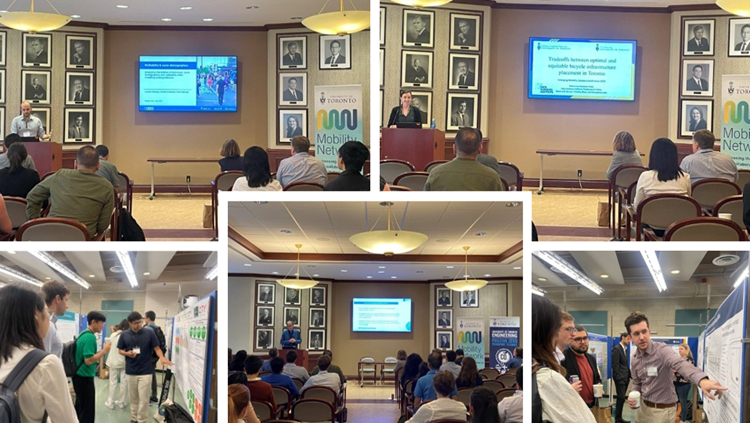
The conference was co-chaired by Professors Marianne Hatzopoulou and Eric Miller and was organized by Drs. Shayamila Gamage and Junshi Xu supported by students and postdoctoral fellows from the University of Toronto, the University of Montreal, and Toronto Metropolitan University. All students and postdoctoral fellows attended the conference free of charge.
The Emerging Mobility Scholars Conference provided a unique forum for graduate students and postdoctoral fellows in Canada specializing in mobility, transportation, and climate change, to share their work, engage in meaningful discussions, and gain a new understanding of the synergies between transportation, climate, and society. The conference fostered networking opportunities among over 100 emerging Canadian scholars, encouraging collaboration and knowledge exchange to advance sustainable solutions for future mobility and climate challenges.
Mobility Network Summer School 2023: “Measure What Matters: Urban Mobility in an Era of Climate Emergency,” June 2023
The Mobility Network, co-sponsored by Positive Zero Transport Futures, hosted its second annual summer school, “Measure What Matters: Urban Mobility in an Era of Climate Emergency,” on June 20 and 21, 2023, at the University of Toronto. Over thirty students and postdoctoral fellows attended the two-day, in-person workshop.
This year’s summer school focused on evaluating government transportation infrastructure investments in terms of benefits for the economy, climate, and society. The students were guided through a series of mini-lectures and case studies that enabled them to produce a set of performance measures that can be used by government agencies when evaluating the “net zero” impact of investments and policy decisions. The performance measures were then applied to real-world transportation investments, and groups were challenged to draft a policy brief and plain language presentation.
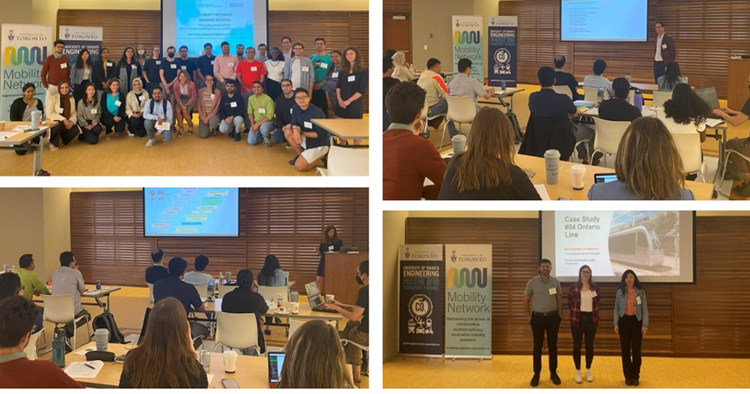
Participants were chosen by applying to the Mobility Network and attended the event free of charge.
The summer school, directed by Drs. Shayamila Gamage and Junshi Xu invited Professors Marianne Hatzopoulou, Daniel Posen and Laura Minet to deliver short lectures on methods to measure travel demand, economic impact, GHG emissions, and social impacts, among other impacts of transport infrastructure projects. Mobility Network Director Professor Eric Miller and Managing Director Dr. Judy Farvolden actively engaged in discussions with the students, providing valuable insights and perspectives. The participating students and postdoctoral fellows were divided into groups, selected a case study, and worked through the process of identifying important indicators, finding methods to quantify these indicators, and preparing a summary of their key findings.
Overall, the summer school offered a valuable and engaging learning experience, fostering critical thinking and effective problem-solving skills among the students. Through practical case studies and interactions with experts, they gained insights into the complex challenges and opportunities related to the impact of transportation investments on the economy, society, and the environment.